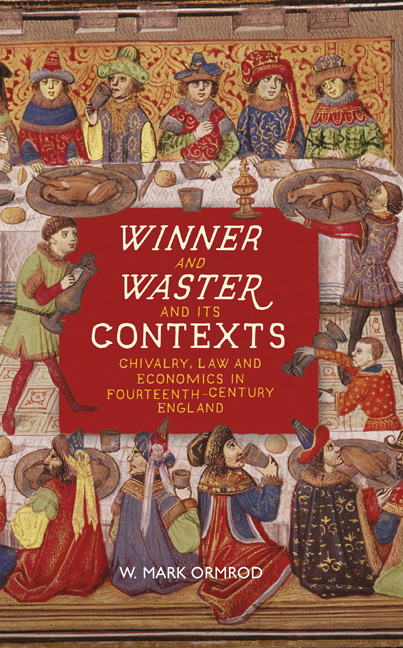Book contents
- Frontmatter
- Contents
- Acknowledgements
- Note on Editions
- List of Abbreviations
- Introduction: Winner and Waster: A Poem on the Times
- 1 Chivalry and Internationalism: The Garter Feast of 1358 and English Diplomacy during the 1350s and 1360s
- 2 Treason, Public Order and Dispute Settlement: The Statute of Treasons of 1352 and Royal Arbitration
- 3 Landed Society, Conspicuous Consumption and the Political Economy: The Sumptuary Laws of 1363
- 4 The Private and the Public Spheres: The Royal Household and State Finance under Edward III
- 5 Satire, Complaint and Authorship: Winner and Waster and the Alliterative Revival of the Fourteenth Century
- 6 Winner and Waster: Timeliness and Timelessness
- Appendix 1 Timeline, 1337–70
- Appendix 2 A Modern English Version of Winner and Waster
- Bibliography
- Index
- Publisher̕s Note
3 - Landed Society, Conspicuous Consumption and the Political Economy: The Sumptuary Laws of 1363
Published online by Cambridge University Press: 09 April 2021
- Frontmatter
- Contents
- Acknowledgements
- Note on Editions
- List of Abbreviations
- Introduction: Winner and Waster: A Poem on the Times
- 1 Chivalry and Internationalism: The Garter Feast of 1358 and English Diplomacy during the 1350s and 1360s
- 2 Treason, Public Order and Dispute Settlement: The Statute of Treasons of 1352 and Royal Arbitration
- 3 Landed Society, Conspicuous Consumption and the Political Economy: The Sumptuary Laws of 1363
- 4 The Private and the Public Spheres: The Royal Household and State Finance under Edward III
- 5 Satire, Complaint and Authorship: Winner and Waster and the Alliterative Revival of the Fourteenth Century
- 6 Winner and Waster: Timeliness and Timelessness
- Appendix 1 Timeline, 1337–70
- Appendix 2 A Modern English Version of Winner and Waster
- Bibliography
- Index
- Publisher̕s Note
Summary
W&W has always tended to be viewed as expressing a tension between two different sub-orders of medieval society: on the one hand (exem¬plified in the figure of Wynnere) those who amassed wealth, assumed to represent the mercantile or wider ‘commercial’ classes; and on the other (in the person of Wastoure) those who spent all their resources in conspicuous consumption, usually regarded as members of the landed elite of nobles and gentry. Gollancz argued that ‘the rise of the new merchant class – the new rich, with all the power of wealth, is an outstanding feature of the poem, and perhaps the main point at issue’. His view has prevailed upon virtually every subsequent critic of the poem. As S. H. Rigby has recently shown, however, the strong emphasis in modern literary scholarship on ‘the rise of a “bourgeoisie” inhabiting a “new world” of money, trade, profit and eco¬nomic individualism’, and the implicit assumption of a tension between it and an ‘old world’ based on land and lordship, rest on a nineteenth-century, liberal-progressive view of the late Middle Ages and the idea that it was at this moment that the market became the primary agent of economic growth and social change. In recent generations, historical scholarship has tended to emphasise that the processes of urbanisation and commercialisation were well under way before the supposed ‘rise of the middle class’ in the four¬teenth century. And the same scholarship has been much more disposed to view the restructuring of society in the later Middle Ages not as the widen¬ing of a gulf between the urban and the rural but in terms of a fundamental shift in the socio-legal relationship between lords and peasants. The collapse of serfdom and the rise in the prosperity of tenant farmers and wage labour-ers after the Black Death created a social hierarchy that was more finely nuanced and more flexible than ever before, and generated unparalleled opportunities for social advancement – not simply through the redistribu¬tion of land but also through service in the Church, in government and in the law and through involvement in manufacturing, retailing and wholesale trade.
- Type
- Chapter
- Information
- Winner and Waster and its ContextsChivalry, Law and Economics in Fourteenth-Century England, pp. 61 - 82Publisher: Boydell & BrewerPrint publication year: 2021



